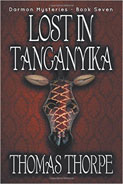
 |
William and Elizabeth Darmon are an English couple stranded on the East African Island Nation of Zanzibar in 1863. Imprisoned by their own their own government for inadvertently upsetting African mores (thereby threatening English economic interests), a terrific storm frees them from prison. They decide to embark across the interior of East Africa by caravan to ultimately find the Nile River and make their way to Cairo and escape. They must deal with Arab slavers, undependable porters, and native tribes who can be welcoming or violent. Ultimately, the cannibalistic Monbuttu tribe subdue them and William makes a devil’s bargain to save their lives. William and Elizabeth separate and encounter a culture of slavery, double-dealing, and tenuous law.
Situated at the height of the New Imperialism of the nineteenth century, the author has created a highly palpable rendering of the cultural and political milieu of 1863 reality in East Africa. His characters obviously sense the cruelty and barbarism that Arab and Colonial powers unleashed on dark-skinned Africans during this period. His plot is perhaps reminiscent of adventure stories about intrepid English derring-do from the 1930's, but he manages to humanize his story by sticking to historical facts and avoiding jingoistic heroism. His depiction of such figures as the pre-Saudi Emir Talal Ibn Abdullah and Barzan palace are based on fact. Themes are perhaps idealism versus pragmatism, law versus barbarity, or even slavery versus freedom–the end result is an illuminating portrayal of African history.